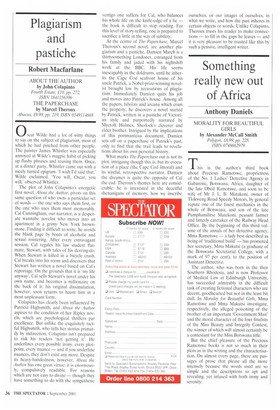Plagiarism and pastiche
Robert Macfarlane
ABOUT THE AUTHOR by John Colapinto
Fourth Estate, £10, pp. 272, ISBN 1841156396
THE PAPERCHASE by Marcel Theroux
Abacus, .,£9.99, pp. 219, ISBN 0349114668
0 scar Wilde had a lot of witty things to say on the subject of plagiarism, most of which he had pinched from other people. The painter James Whistler was especially annoyed at Wilde's magpie habit of picking up flashy phrases and reusing them. Once, at a dinner party, Whistler came out with a nicely turned epigram. 'I wish I'd said that,' Wilde exclaimed. 'You will, Oscar, you will,' observed Whistler.
The plot of John Colapinto's energetic first novel, About the Author, pivots on this same question of who owns a particular set of words — the one who says them first, or the one who uses them most memorably. Cal Cunningham, our narrator, is a desperate wannabe novelist who moves into an apartment in a grimy New York brownstone. Finding it difficult to write, he avoids the blank page by bouts of alcoholic and sexual roistering. After every extravagant session, Cal regales his law student flatmate, Stewart, with tales of his derring-do. When Stewart is killed in a bicycle crash. Cal breaks into his room and discovers that Stewart has written a novel based on Cal's reportage. On the grounds that it is 'my life anyway', Cal sells Stewart's novel under his own name, and becomes a millionaire on the back of it; his original dissimulation, however, soon returns to haunt him in a most unpleasant form.
Colapinto has clearly been influenced by Patricia Highsmith, and About the Author aspires to the condition of her Ripley novels, which are psychological thrillers par excellence. But unlike the exquisitely tactful Highsmith, who tells her stories primarily by indirection, Colapinto isn't prepared to risk his readers 'not getting it'. He underlines every possible irony, every plotpoint, every nuance — and if you underline nuances, they don't exist any more. Despite its heavy-handedness, however, About the Author has one great virtue: it is enormously, compulsively readable. For reasons which are not easy to divine — though they have something to do with the sympathetic vertigo one suffers for Cal, who balances his whole life on the knife-edge of a lie — the book is difficult to stop reading. For this level of story-telling, one is prepared to sacrifice a little in the way of subtlety.
At the centre of The Paperchase, Marcel Theroux's second novel, are another plagiarism and a pastiche. Damien March is a thirtysomething Londoner, estranged from his family and jaded with his nightshift work at the BBC. His life seems inescapably in the doldrums, until he inherits the Cape Cod seafront house of his uncle Patrick, a Nobel-prize-winning novelist brought low by accusations of plagiarism. Immediately Damien quits his job and moves into Patrick's house. Among all the papers, bibelots and arcana which cram the property, he discovers a novel started by Patrick, written in a pastiche of Victorian style and purportedly narrated by Mycroft Holmes, Sherlock's cleverer and elder brother. Intrigued by the implications of this portmanteau document, Damien sets off on a paperchase of Patrick's past, only to find that the trail leads to revelations about his own personal history.
What marks The Paperchase out is not its plot, intriguing though this is, but its evocation of a place (the Cape Cod littoral) and its wistful, retrospective narrator. Damien the dreamer is quite the opposite of Cal the cad. Theroux's themes here are considerable: he is interested in the deceitful shenanigans of memory, how we inscribe ourselves, or our images of ourselves, in what we write, and how the past inheres in certain objects or words. Unlike Colapinto, Theroux trusts his reader to make connections — to fill in the gaps he leaves — and it is very pleasant to be trusted like this by such a pensive, intelligent writer.


























































 Previous page
Previous page